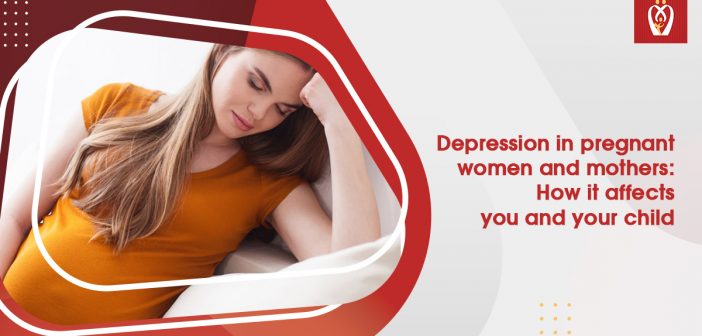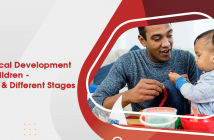Depression is a mental illness that influences how people think, act, and feel. Approximately 6% of women will suffer from depression at some point. This figure rises to nearly 10% (1 in 10) for pregnant women.
Women are more vulnerable to depression in pregnancy and the weeks and months following childbirth. Pregnancy hormone changes can affect brain chemicals, causing depression. Pregnant women may be unaware that they are depressed. They may believe they are experiencing pregnancy symptoms or the “baby blues,” which many women experience immediately after giving birth.
It’s also worth noting that up to 10% of fathers experience postpartum depression after the birth of a child.
The good news is depression can be treated. Read the warning signs listed below and consult your doctor if you notice any of them. Inform your partner and family members of the warning signs so they, too, can be alert.
What are the signs of depression in pregnancy?
Depression in pregnancy can happen gradually. Everyone experiences different symptoms. They are classified as mild, moderate, or severe. Some of the more common symptoms include:
- Changes in appetite, such as eating too much or losing interest in food
- Changes in sleep, such as difficulty sleeping or sleeping too much
- Lack of energy
- Feeling sad, hopeless, or worthless
- Crying for no reason
- A loss of pleasure or interest in your normal activities
Depression can make it difficult for new mothers to care for their children. They may not want to spend time with their baby, which can result in a crying baby.
What causes depression in pregnancy?
Many changes happen in your body during pregnancy, and stress can lead to depression in early pregnancy. However, not everyone who becomes pregnant suffers from depression.
If you previously had depression, your symptoms may return, or if you suffered from depression before becoming pregnant, it might worsen.
Discussing depression with your healthcare provider during pregnancy is important because it can last after delivery. Women who suffer from antenatal depression during pregnancy are more likely to suffer postpartum depression (depression after the baby is born).
How does depression affect pregnant women?
If you are depressed while pregnant, you may have difficulty caring for yourself. Depression in pregnancy can also result in:
- Miscarriage
- Premature delivery or giving birth to a small baby
Difference between “baby blues” and postpartum depression
There is a mild form of postpartum depression known as the “baby blues.” Usually, it lasts from 1 to 3 days after the birth and can last for 10 days to 3 weeks. Many women who suffer from “baby blues” experience mood swings—being happy one minute and crying the next. Also, they may experience anxiety, confusion, or difficulty eating or sleeping. Up to 80% of new mothers experience “baby blues.” It’s common and will pass on its own.
Postpartum depression affects about 13% of new mothers and is more severe and lasts longer. You are at a higher risk if you have a family history of depression or have previously experienced depression. Some of the symptoms are:
- Have a feeling like you can’t care for your baby
- Extreme panic attacks
- Difficulty making decisions
- Feeling very sad, hopeless and
- Feeling out of control
Will my children suffer if I am depressed? | depression in pregnancy
Depression is curable. However, if it is not treated, it will have an impact on your children.
Depressed mothers may struggle to care for their children. They can be loving one moment and then withdraw the next. They may respond negatively to their child or not respond at all. Your emotions and behavior will impact your ability to care for your children.
Having depression can also affect attachment, which is important for your child’s development. Attachment is a deep emotional bond formed by a baby with the person who provides most of his care. A “secure attachment” forms on its own. A mother responds to her crying baby by providing whatever she believes her baby needs—feeding, diaper change, cuddling, etc. Secure attachment protects against stress and is necessary for a baby’s long-term emotional health. It gives a baby a sense of safety and security and teaches him to trust others.
Will antidepressants harm my baby if I take them during my pregnancy?
You may assume that you should stop taking medication. Remember that if depression in pregnancy is not treated, it can have serious consequences for you and your baby. Pregnant women taking antidepressants should consult their GP/midwife before discontinuing any medication.
If their mothers took antidepressants during pregnancy, some newborn babies might experience symptoms such as irritability, rapid breathing, tremors, and poor feeding. It usually takes two weeks for these symptoms to resolve. A quiet environment, swaddling, skin-to-skin contact, and small regular feeds typically work well for these babies. Serious issues, such as heart defects or more severe breathing problems, are extremely rare.
Your healthcare provider will closely monitor you and your baby after birth to ensure you are both in good health. Just to be safe, you may have to stay an extra day or two in the hospital.
Can I breastfeed my baby while taking antidepressants?
Breastfeeding has multiple health benefits for babies. It also helps in the bonding of mothers and babies. Small amounts of antidepressants will pass through your breast milk if you take them. However, studies have shown that children who were exposed to these drugs through breast milk had no adverse effects.
If you take antidepressants, you can still breastfeed. However, stopping an antidepressant while breastfeeding may result in a relapse of depression.
How can Nurturey help you?
If you suffer from depression in pregnancy, you can make appointments with your GP/midwife with the Nurturey pregnancy app. Also, the Nurturey PinkBook is the best alternative to the NHS RedBook, which gives you access to your child’s health records, upcoming health checkups, and trusted NHS information relevant to your stage of parenting and pregnancy. Parents and expecting mothers can also connect their GP accounts to the PinkBook. With the Nurturey pregnancy app, you can reorder prescriptions and message your doctor if you have any concerns about yourself or your child.







